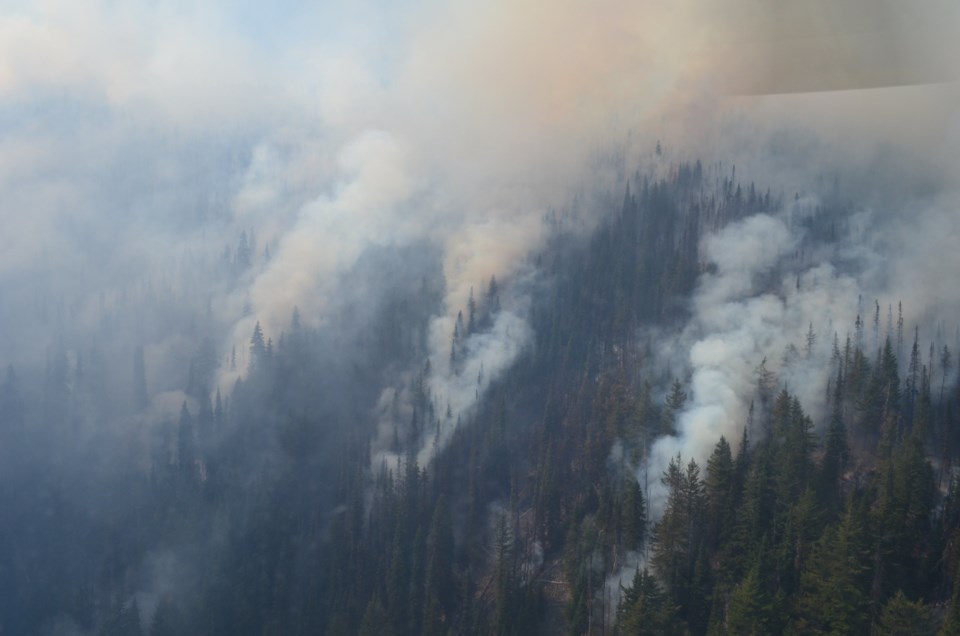As the province continues to battle the aftermath of an unprecedented heatwave, including an early and intense wildfire season, a University of Northern British Columbia (UNBC) professor says we need to adapt to the realities of climate change.
UNBC Associate Professor of Environmental Studies, Jospeh Shea said heatwaves are a logical consequence of climate change and they are projected to be more frequent and intense.
“We use that word ‘unprecedented’ all the time now, but this was simply without precedent and also recent analysis showed it was virtually impossible to happen without climate change,” said Shea, regarding the heat dome that settled over B.C. between June 25 and July 1.
Temperatures reached well over 40 C in many communities and the town of Lytton set an all-time Canada-wide temperature record at 49.6 C. A day later, a wildfire destroyed the community, killing two people.
A team of 25 scientists through the World Weather Attribution concluded the event was made 150 times more likely due to human-caused climate change.
Under worst-case emission scenarios, the study found climate warming would lead to similar events every five to 10 years by the 2040s, when the world is expected to have undergone 2 C of human-induced warming.
“Aside from mitigating our emissions and sneezing or carbon in the atmosphere we need to adapt,” said Shea, adding that preparing and adapting to these events is important as they are going to happen more frequently and could be more intense.
“Personally; I think the response wasn't sufficient in our region for this heatwave.”
Sudden deaths during the heatwave climbed past 800 with the BC Coroners Service reported 610 more sudden deaths across the province when compared to the five-year average over the same period.
“Places that have had these in the past know how to deal with them. They set up cooling shelters and they get people out and I think we should treat it the same way as a wildfire or flood,” added Shea.
“If there's a projected heatwave coming we need to let people know that there are options, let them evacuate if they need to. You don't have to sit in a sweltering apartment in the middle of a 42 degrees heatwave. There have to be options available. That's the adaptation part.”
Shea says he expects rapid response research on the environmental effects of the heatwave will start to be published in the next few months. The big impacts of the heat dome, of course, include wildfires due to dry forests and flooding due to the melting of alpine snowpack.
“The heatwave started to dry out our forests and the moisture that's usually in the soils in the spring,” said Shea.
“There's lots of water around in the spring and summer in this part of the province, but that heatwave quickly removed that moisture from the soil layers and from the vegetation and that's why the fire rate is so high right now. The susceptibility is very high, so it doesn't take much to get them started.”
The province is on track to have one of its worst fire seasons. As of July 19, there are nearly 300 wildfires burning in the province and 1,135 wildfires started this year which is well above the mid-July average of 209.
Another effect is the loss of mountain snowpack which caused flooding in Mount Robson and the water levels of the Fraser River to rise.
High water washed out Berg Lake, Mount Fitzwilliam and Moose River Trails in Mount Robson which will remain closed until July 31.
“You remove that alpine snowpack and it’s going to expose glacier ice to melt earlier than it normally is,” said Shea, adding that melting is about three weeks ahead of where it was last summer.
“That is a huge increase in the duration of the melt season so I suspect we're going to see a big melt year for the glaciers in the province.”
Shea said the intensity of the heatwave was startling for the region and although the science on climate change is extremely clear one of the big hurdles it faces is the political will to address it.
“A year or two ago, I would have said to start doing all the things that we can do personally to reduce our emissions. But at this point I think the most important thing we can do is elect people who are going to make the political changes that we need to have happen,” said Shea.
“It's a systemic change that has to happen and to put that burden on individuals is really not fair. It's on the industries that produce the emissions, and it's on the systems that force us to keep using fossil fuels and those are the systems that need to change.”
Shea said that although the climate is locked into some level of warming for the near future it is not too late to turn the corner.
“We should have done it twenty years ago, but we didn't. So let's start today,” said Shea.
“I really think we can make some big strides on reducing our emissions and building new industries and having people employed with good jobs. I think it's all possible.”
- with files from Stefan Labbé, Glacier Media






